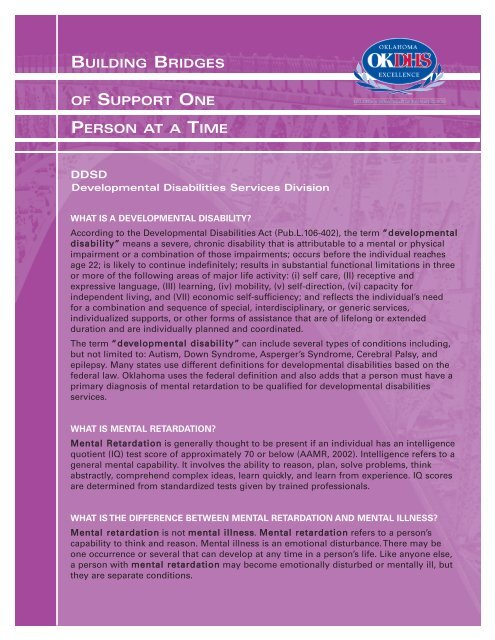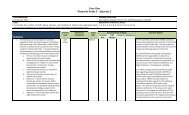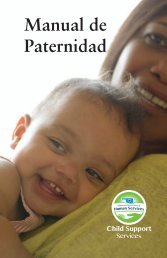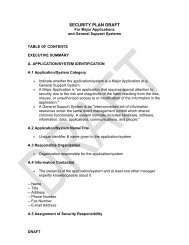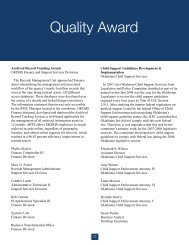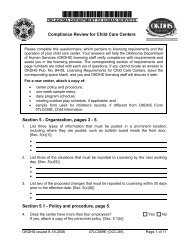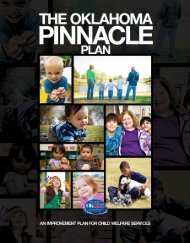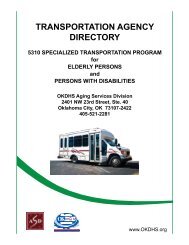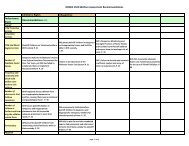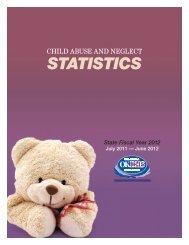Developmental Disabilities Services Division Fact Sheet - Oklahoma ...
Developmental Disabilities Services Division Fact Sheet - Oklahoma ...
Developmental Disabilities Services Division Fact Sheet - Oklahoma ...
You also want an ePaper? Increase the reach of your titles
YUMPU automatically turns print PDFs into web optimized ePapers that Google loves.
BUILDING BRIDGES<br />
OF SUPPORT ONE<br />
PERSON AT A TIME<br />
DDSD<br />
<strong>Developmental</strong> <strong>Disabilities</strong> <strong>Services</strong> <strong>Division</strong><br />
WHAT IS A DEVELOPMENTAL DISABILITY?<br />
According to the <strong>Developmental</strong> <strong>Disabilities</strong> Act (Pub.L.106-402), the term “developmental<br />
disability” means a severe, chronic disability that is attributable to a mental or physical<br />
impairment or a combination of those impairments; occurs before the individual reaches<br />
age 22; is likely to continue indefinitely; results in substantial functional limitations in three<br />
or more of the following areas of major life activity: (i) self care, (II) receptive and<br />
expressive language, (III) learning, (iv) mobility, (v) self-direction, (vi) capacity for<br />
independent living, and (VII) economic self-sufficiency; and reflects the individual’s need<br />
for a combination and sequence of special, interdisciplinary, or generic services,<br />
individualized supports, or other forms of assistance that are of lifelong or extended<br />
duration and are individually planned and coordinated.<br />
The term “developmental disability” can include several types of conditions including,<br />
but not limited to: Autism, Down Syndrome, Asperger’s Syndrome, Cerebral Palsy, and<br />
epilepsy. Many states use different definitions for developmental disabilities based on the<br />
federal law. <strong>Oklahoma</strong> uses the federal definition and also adds that a person must have a<br />
primary diagnosis of mental retardation to be qualified for developmental disabilities<br />
services.<br />
WHAT IS MENTAL RETARDATION?<br />
Mental Retardation is generally thought to be present if an individual has an intelligence<br />
quotient (IQ) test score of approximately 70 or below (AAMR, 2002). Intelligence refers to a<br />
general mental capability. It involves the ability to reason, plan, solve problems, think<br />
abstractly, comprehend complex ideas, learn quickly, and learn from experience. IQ scores<br />
are determined from standardized tests given by trained professionals.<br />
WHAT IS THE DIFFERENCE BETWEEN MENTAL RETARDATION AND MENTAL ILLNESS?<br />
Mental retardation is not mental illness. Mental retardation refers to a person’s<br />
capability to think and reason. Mental illness is an emotional disturbance. There may be<br />
one occurrence or several that can develop at any time in a person’s life. Like anyone else,<br />
a person with mental retardation may become emotionally disturbed or mentally ill, but<br />
they are separate conditions.
HOW MANY PEOPLE ARE AFFECTED BY MENTAL RETARDATION?<br />
Studies have shown that somewhere between 1 and 3 percent of Americans have<br />
mental retardation, depending on how they are counted. Based on an IQ score alone, the<br />
percentages would be closer to 3 percent.<br />
It is difficult to pinpoint exactly how many people have mental retardation. Studies alone<br />
may not identify everyone. Many parents and professionals throughout the U.S. report that<br />
they are aware the label “mental retardation” can bring offense, and for this reason they<br />
avoid its use. Many school-age children receive a diagnosis of learning disability,<br />
developmental delay, behavior disorder, or autism instead of mental retardation. Many<br />
adults who technically could be said to have mental retardation live independent,<br />
productive lives and avoid all labels. Their success and their lack of functional limitations<br />
may mean that they are not included in studies that count the number of adults who have<br />
cognitive, intellectual or related developmental disabilities. (The Arc, 2004)<br />
HOW DO COGNITIVE AND INTELLECTUAL DISABILITIES SUCH AS MENTAL RETARDATION<br />
AFFECT INDIVIDUALS?<br />
The effects of these disabilities vary considerably among people who have them, just as<br />
the range of abilities varies considerably among all people. Children may take longer to<br />
learn to speak, walk, and take care of their personal needs, such as dressing or eating.<br />
People may take longer learning in school. As adults, many people will be able to lead<br />
independent lives in the community without paid supports. A small percentage will have<br />
serious, lifelong limitations in functioning.<br />
OKDHS Pub. No. 05-28 /Issued 08/2005/This publication is authorized by the Commission for<br />
Human <strong>Services</strong> in accordance with state and federal regulations and printed by the <strong>Oklahoma</strong><br />
Department of Human <strong>Services</strong> at a cost of $1,010.60 for 5,000 copies. Copies have been<br />
deposited with the Publications Clearinghouse of the <strong>Oklahoma</strong> Department of Libraries. OKDHS<br />
offices may request copies on ADM-9 electronic supply orders. Members of the public may obtain<br />
copies by contacting the OKDHS Records Center at (405) 962-1721 or 1-877-283-4113 (toll free).<br />
CAN EDUCATION, TRAINING, AND SUPPORTS HELP?<br />
While people with developmental disabilities learn more slowly than other people, they<br />
have many of the same hopes, fears, joys, problems, and needs that others do. They have<br />
talents and abilities that should be developed through individualized education, job<br />
training, and specialized therapies such as physical, occupational, and speech therapies.<br />
Supports can enhance individual functioning. Supports can come from family, friends, and<br />
community or from a service system such as the <strong>Oklahoma</strong> Department of Human <strong>Services</strong><br />
<strong>Developmental</strong> <strong>Disabilities</strong> <strong>Services</strong> <strong>Division</strong>.<br />
With early intervention as children, and appropriate education, training, and support s<br />
as adults, all people with developmental disabilities can lead satisfying lives in their<br />
communities. The end result is a better, more normal life for people who have the same<br />
rights and responsibilities as anyone else.<br />
For more information about developmental disabilities or available services, contact DDSD<br />
at (405) 521-3571 or toll free (866) 521-3571.<br />
References:<br />
The Arc, Q&A, revised 2004. Web Site: www.thearc.org.<br />
American Association on Mental Retardation. (2002).<br />
Mental Retardation: Definition, Classification, and<br />
Systems of Supports, 10th Edition.<br />
Washington, DC: American Association on Mental Retardation.<br />
American Association on Mental Retardation. (2004).<br />
<strong>Fact</strong> <strong>Sheet</strong>: Frequently Asked Questions About Mental Retardation.<br />
www.aamr.org/Policies/faq_mental_retardation.shtml.<br />
<strong>Developmental</strong> <strong>Disabilities</strong> Assistance and Bill of Rights Act of 2000.<br />
PL 106-402.<br />
U.S. Department of Health and Human <strong>Services</strong>, Administration on<br />
<strong>Developmental</strong> <strong>Disabilities</strong>.<br />
www.acf.hhs.gov/programs/add/.


